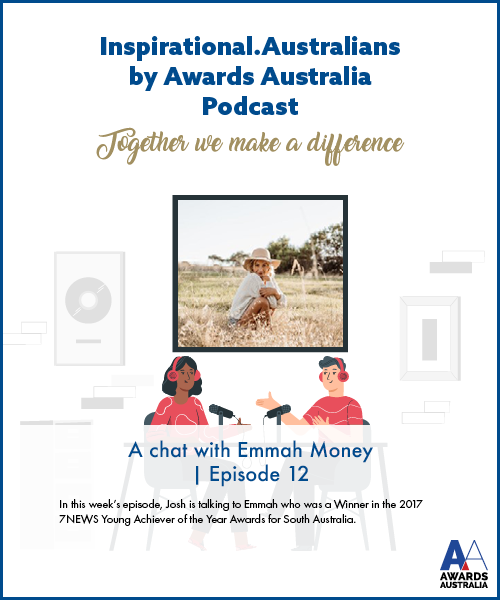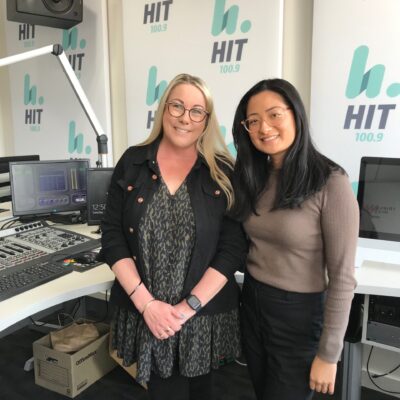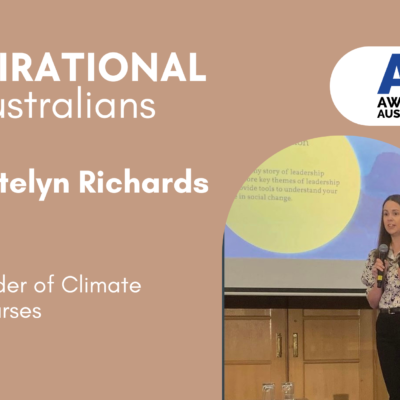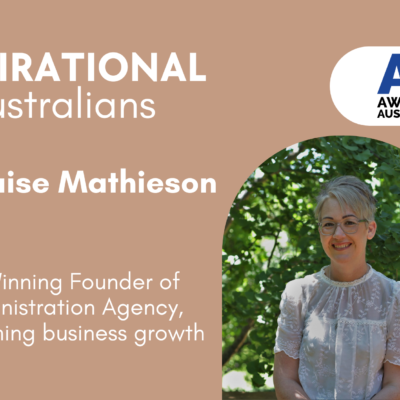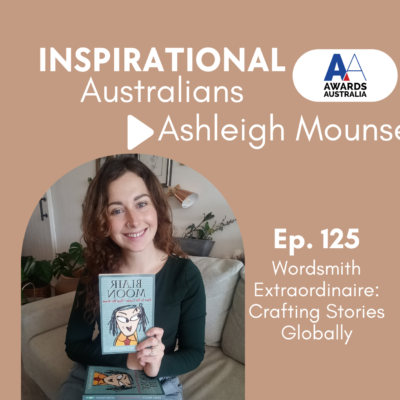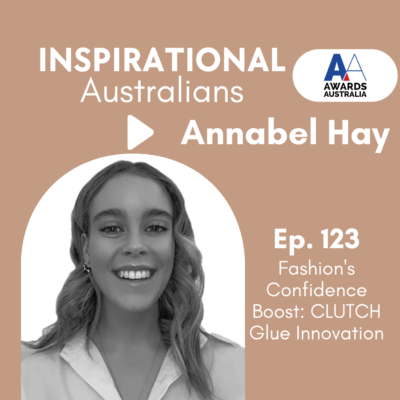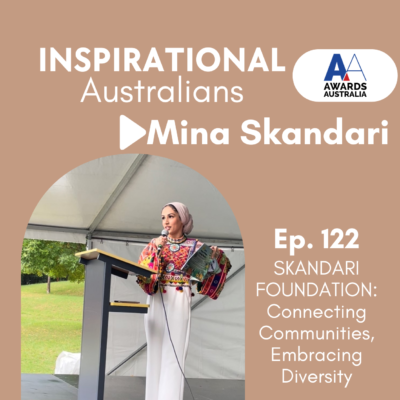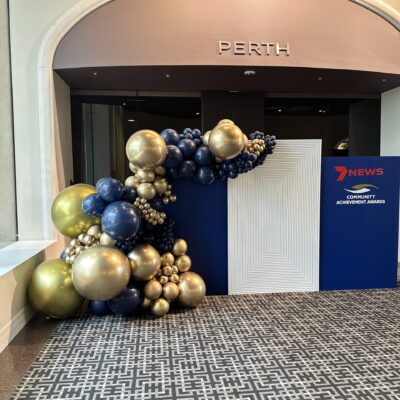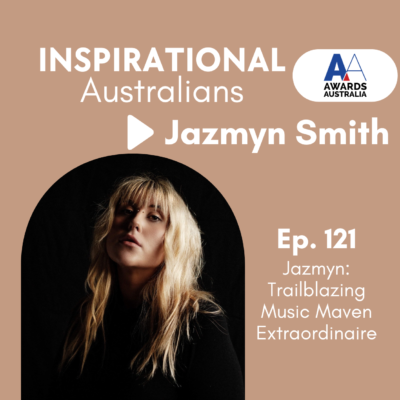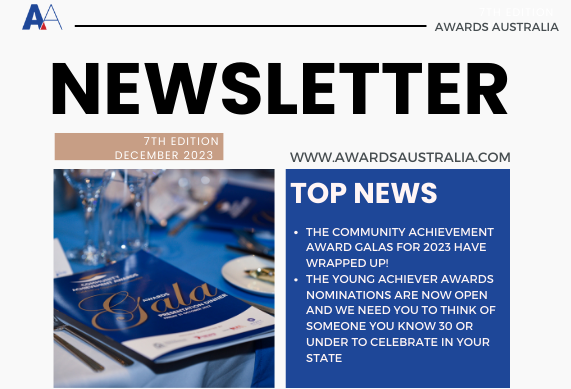In this week’s episode, Josh is talking to Emmah who was a Winner in the 2017 7NEWS Young Achiever of the Year Awards for South Australia.
Emmah Money is this year’s 2020 Australian of the Year, South Australian Local Hero. Emmah suffers from Cystic Fibrosis fighter, the most common life-threatening illness effecting Australians today. Emmah has a credible list of achievements and she continues to make a positive difference within the community.
Emmah is also a Mother to two young children, an author and a motivational speaker, where she speaks across the country to not only raise awareness for Cystic Fibrosis, but to empower and inspire others.
Emmah says she has a list of to-dos, not impossibles and the list is forever growing. Through her social media channel, CF Mummy, Emmah shares her journey on motherhood and having an invisible disability. Emmah also has many other exciting adventures that her followers are able to join her on.
In this episode:
- Hear about Emmah’s incredible life journey and her struggles
- Some of Emmah’s mottos are: I don’t knock on doors – I bang them down! I have a list of “to-do’s” not a list of “impossibles”
- Did you know what a CF sufferer has to do each day just to keep their lungs clear?
- A really interesting listen of determination, commitment and continued advocacy in wanting to make a difference and increase public understanding of CF
Follow us on our Inspirational.Australians Instagram Page
Want to nominate someone? (It can take as little as 2 minutes to recognise someone making a difference)
Like some more information on Corporate Partnership?
Transcript
Annette:
Welcome to the inspirational Australians podcast, where we chat to people, making a difference in their communities and in the lives of others. And here is your host for today, Josh Griffin
Josh:
Hello and welcome to today’s episode of the Inspirational Australia’s podcast. Joining me today, we have Emmah Money who I met back in 2017 as part of the Young Achiever Awards for South Australia, where Emmah was a finalist and went on to be the winner in the Webster’s Lawyer Service to the Community Award. Since then I’ve followed her in her journey from a far, but I really enjoy often inspiring myself and a lot of the hardships that Emmah has to go through just to live a normal life. And so I’m really excited to speak to her today in addition to her involvement with the Young Achiever Awards, she is also currently the 2020 Australian of the year South Australian Local Hero. Now Emmah suffers from cystic fibrosis and I love this term, you know, she is a cystic fibrosis fighter. And for those who don’t know, CF for short is the most common life-threatening illness affecting Australians today. Emmah has an incredible list of achievements and she continues to make a positive difference within the community. Emmah, thanks so much for being on the podcast today.
Emmah:
Thanks for having me today, Josh. Very excited to talk to you.
Josh:
Yeah, no worries. I’m wondering if we can get started by saying if you can remember from those few years ago, three years ago seems like a lifetime now, especially because 2020 itself seemed to go on for three years. If you can remember back in 2017 being part of the young achiever awards and what kind of that experience was like for you.
Emmah:
You know, it’s very funny. I’m very, I’ve got a confession to make about that.. So when I, I got an email to say that I had been nominated and I didn’t realize it was a legitimate email. I thought it was spam. So I probably got to pulling it up, asking me for the questions and I just didn’t think much of it. Then I finally got a phone call from someone saying, actually you’ve been nominated, you’re a finalist. And I was, I was very overwhelmed in the way of just shocked. So I was like, Oh, I probably need to take this seriously and I think in saying that when, when someone nominates you for such a credible achievement or in a category like that, you know, it really puts it into perspective for the work that you do within whatever that world is. So for me, within the CF community and the broader community here in South Australia, it was a really humbling experience in just being nominated, to acknowledge the work that I do. So I, um, yeah, I, again, when I got to the awards night I actually remembered the night and I was a bit oblivious to just how significant the award was, and I was taken away by the people that were attending as far as, you know, the other nominees in my category, as well as the other categories. I think it was such a great award in the sense that there are so many unsung heroes doing wonderful things within their communities and beyond. So, I’ve really enjoyed the experience. I still think to some of the other people within the category I was in, I used to become a part of an alumni, you know, forever and, and having these new contracts with people that are like minded to an extent.
Speaker 3:
So yeah, it was a very very overwhelming experience. And to have my name called out, you know, they tell you to prepare a speech just in case you win. Um, you never know. And then, all of us were laughing and all, you know it won’t be me. The next comment we got was you’re probably all thinking it won’t be me. So when my name got called out and they saw your picture up on the big screen and knowing who is in the audience, um, very important people there. Um, yeah, I was in tears, but I’m pretty sure I might faint, I cried. I felt like I was winning a Logie, you know, I’m always wanting to be, I always sort of loved being in the media, so it was kind of my time to shine on stage. So yeah, it was a very, I’m still very humbled to have been recognized in that environment.
Josh:
So we’ll have to post the photo actually to our Instagram page, Inspirational.Australians Instagram page, because yeah, you are being you in that photo of you accepting the award. And I think what you’re describing there, you can really say that, but you’re like, Oh my God, I can’t believe it.
Emmah:
Oh, I have to see the photo that you’re talking about. I genuinely, I took my parents alone that night, you know, and said, Oh come to this award. And even they said to me, Emmah you really need to have a look at the things that you know, but when you get told you’re in a category like this, it’s a very important event. I was very oblivious to just how significant it is and wow. What a, what an amazing beginning of, you know, a journey that I’ve, you know, if you told me three years later, this is where I would be now. I would not have imagined half of the things I’ve been able to do. And I think it all comes down to, you know, um, someone said to me recently that when you do things in a, um, in a voluntary and volunteer role, you know, meaning the stuff I do with cystic fibrosis, the advocacy, the mentoring, the fundraising, being the ambassador for the cure of CF foundation, it’s all a voluntary role. I don’t get asked. I don’t get paid to do it. And it’s for the love of what I’m doing and my passion. So when you win an award or, or even just being recognized in a nomination, um, category, it’s very humbling to, um, you know, have that behind you and, and have the community support. Iif you can get one nomination a year for some sort of an award, it’s kind of like, you’re setting yourself a professional growth. So yeah, so that this award really set the standard for me yeah.
Josh:
Yeah, that’s cool. It Is interesting reading your, you know, the little profile we had on you from back then, and then to, to now, and I know you mentioned just then the growth, like I know now you’re doing so much great, like motivational speaking and public speaking, and I think that’s kind of been a bit of a change in the last few years. How do you, how’d you get into that originally?
Emmah:
Yeah. So I always, I guess when you talk about growth and when I talk about growth, I started speaking, I always sort of have spoken very publicly and openly to an extent about my personal journey of living with cystic fibrosis. My story is very far from normal. Um, you know, having been given up for adoption because of my illness and there were so many things, which I’m sure we’ll go into in a little bit. Um, but I think the growth that came from it is when I realized that, you know, I can be a voice for not just myself, but to help others. So I started talking in schools across South Australia, um, from, and I used to just sort of, people would say I have cystic fibrosis. And I would talk about my journey, um, and also the learnings and the things that I’ve learned, you know, um, there’s been so many different things from having an invisible disability to growing up and coming from, you know, being bullied through high school.
I started to work out probably in the last couple of years in particular that there are so many elements of my life stories that are actually really good lessons. So I’m very big on, you know, in order to make things happen sometimes in life, you need to own that and be in control of that. So I don’t knock on doors, but I kick doors down, so to speak. Um, and then I can deal with the mess and what, what it is. So I actually got in touch with someone, actually, my brother-in-law helps me. He’s in the education department and we worked out my story and the key points and what part of it would be, um, looked at from an education, from the education to the staff. So we aligned my personal story and my talk, um, a lot to align with health and physical education. My actual talk that I can do in schools, uh, um, keeping the kids can be graded on that. There’s so many key learnings from what I actually talk about. So it’s a lesson, so I’m really proud to talk. Like I said, you know, I talk about disability, diversity, resilience, and it’s just a matter of, you know, being through so much. And, um, I’ve been able to tie it all together to put it out there, um, to help others. And I always say, my story can help one person a day, or if my attitude can be what somebody needs to hear in a day, then I can say not knowing that, you know, I’m changing the world, be a better place. Yeah.
Josh:
And that’s all he can do. Just one, one at a time. Sometimes people bite off more than one can chew otherwise.
Emmah:
Yeah. Yep. Definitely.
Josh:
I do want to touch on a, you know, what you mentioned just before, um, about, you know, your story being a bit different and, you know, that’s, if I’m being honest, when you Google Emmah Money, one of the first articles that comes up is, you know, it does talk about how you were adopted and that kind of stuff. Now, can you give people a little bit of background on, you know, maybe explain a bit of that about you and your story.
Emmah:
Yeah, sure. So I, um, I literally, in a nutshell, I was given up for adoption. My biological family was new to Australia from Greece. Um, so when they had me, there was a very limited language,no English background given that they’re Greek. So they were told when I was diagnosed, I was diagnosed with cystic fibrosis, which most babies are, just to share a fact, you know, every four days in Australia, a baby is born with cf. Yes, it’s very common. It is hereditary, babies are tested now at birth to see if they have cf. So it’s a prick at the bottom of their heels that they undergo. So I was diagnosed straight away. Um, and then I was born in 87. So back then if you would look at the statistics of cystic fibrosis for a child to survive childhood was very unlikely. So my story’s a bit quirky in the way I was given up for adoption and then by Christmas I already had a mom and dad who were just going through those options. Now, my parents are very amazing people. You know, they, one, they adopted me knowing I had cystic fibrosis, but two, my dad is a paraplegic. So he has no kidneys and just a bit of a side story. But during a COVID, you know, we’ve always joked, dad’s always had one leg, one hip and his story is just amazing and remarkable. But during COVID that he was involved in an accident and actually had the only leg, he has amputated, my family this last few months, our story just never seems to get dull. There’s always something crazy going on. So my dad’s my inspiration because, you know, he continues to not let his disability define him. And I, I see him crash and fall, but I’ve learned how he rises and overcomes it. So I’m very grateful for that. But I guess having them adopt me, they never saw me as a, as a baby that was going to die. And like many people would potentially think. And, you know, I know many new parents that had little ones that are diagnosed with CF which naturally we Google what that is. And it is very confronting if not scary just to think of what you go through. So I’m really grateful to have a mom and dad that not only adopted me because of it, but never saw CF as a bad thing. And having a dad with a very visible disability, knowing that I have an invisible disability, kind of me, he actually missed my first birthday because he was representing Australia in the Seoul Paralympics, he did powerlifting, weightlifting. So disability has never been a reason for failure in our family. And it’s never been seen as that, so that, yeah, I have two amazing parents who adopted me and they’ve given me the most wonderful life I’ve had, and there’s been a lot of hiccups along the way, just a few days before my 17th birthday. Um, I actually found my biological parents here in Adelaide by accident. Yeah. And I went on to find out that my birth father actually thought that I had passed away. So she believed she’d given me up for adoption and then the baby had passed away. Um, I have a brother four years older than I am, and he remembers, um, his baby sister passing away. He says he used to go visit her in the hospital and then he wasn’t allowed to anymore. Cause she wasn’t there. So you could imagine the kind of wounds that opened. And obviously I talk about it, but there was obviously a lot that I don’t go into with that. So the adoption side of my life, let alone everything else. That’s, that’s been a roller coaster big time.
Josh:
Yeah, yeah. Yeah. Well Emmah, um, you know, if you don’t want to go into it, that’s fine. But how did you stumble across your, your parents and actually I need to know quickly your dad is alright?
Emmah:
Yes, my dad, this is the best thing about the story. Um, he went, he ended up in rehab for a couple of months, and it’s really funny because they say, you know how your energies, I’m all about energies and all of that. You know, when you say your parents or someone close to you that is suffering and in pain, you don’t realize how that affects you. So watching my dad go through that obviously affected our entire family, but it’s probably been the last month where he made some decisions, um, for his health and what a positive change it may. Um, and I’ve just went, you know, if dad can, I guess, yeah. If you can appreciate and accept sometimes that things aren’t always going to be okay. Once you learn what the problem is that he’s now learning, he’s a man with no legs. Um, and he’s done sounds like, cause he’s like kidneys and, um, there’s so much for dad to not be happy about in that, but he doesn’t feel sorry for himself. And he continues to tell he just never ceases to amaze. He’s a mountain. So he’s very happy. He’s got, you know, keeping him on his toes, on his wheels. So he’s a very positive person. I’m very lucky to have to have that. Um, yes, my best family crazy. Right.
Um, I was only, I was out one evening with some girlfriends, I was 16 around 16 on an under age disco. I had a friend drop me home, a friend’s friend. It sounds a bit dodgy in this story. I had a really good friend of mine who was a male. We had another friend, right. I’m trying not to lose you with this explanation. Um, so these male friends friend said he could drop me in my two girlfriends home because I missed the last train home. And it was the first time my mum had ever trusted me to do the right thing. And I missed the train,typical. And I needed to be home at a decent time. So as we were driving, we had about a 45 minute drive. The driver kept looking at me and the revision to me and I was a little bit uncomfortable naturally. Um, and then I remember him saying to me a few things like, why do you think you’re out there? Like, um, I was very confused and my other friend, he said, well, she’s obviously not who you think she is. Um, this is just how I remember it. And anyway, turned out this male. This guy actually thought I was his biological sister. Who’s 14 months younger than I am. And he said, Oh, I’m really sorry. I thought you were somebody else. He asked me what nationality I was. And I said, I’m Greek. And so he said a couple of words in Greek to me and I said, hi, sorry, I don’t understand Greek. And he said how do you know it’s Greek, if you don’t understand Greek. And that’s all, it’s got a long car ride. I’ll tell him the story about my adoption. Anyway, he pulled over and said, Oh my God. Um, he actually was very good friends with my biological brother and remembers my biological brother losing a baby. So he rang my brother there and then, and said, you’ll never guess who’s in the car. And you could imagine how I was feeling like this was absolutely crazy. And I mean, I’ve always known, I’m adopted my dad’s black on white. It’s a dead giveaway. Um, and mom and dad have always been very open about my cystic fibrosis. Um, the adoption, if I’ve ever wanted to know anything. I’m very lucky to be bought up in that supportive environment. So, um, anyway, I spoke to my brother very briefly that evening and he got very angry at me and sort of said I was the crazy person and was just the dyes and not who I say I was Anyway, we’ve got information, obviously told my parents and good old Google just took a couple of things to enter into Google, but you couldn’t do now. Um, yeah, it was within a couple of months. I actually found where they live, which happened to just be not very, not too far from, I am here in Adelaide. Um, and then I thought I would send my birth mom and sister a letter telling them who I was and sorry, mum and brother a letter. And the day my birth mom got her letter. I was actually in the, um, the paper here in Adelaide and the article was beating illness should be in fashion. So it was like the first modeling gig where I was, because I did a bit of modeling back in the day, um, first week where I combined modeling and CF and in my letter I explained who I was and long story short, we ended up all meeting. And, um, it was very, yeah, it was very difficult for awhile because they all thought that I had passed away, there was a sister who never even knew I existed. A brother older, who was just in awe, I’ll tell you the story. I met him first. Actually he rang me after receiving his letter. He got his first, my birth mom got hers the day after. Me and my girlfriend were driving down a main road, going through a hungry depth around that place because we just got our driver’s license and you go for a cruise. Yep. Yep. I think we all did that. We were going for a and I was in my trackies and I had this boy rang me and said, hi and hi, is this Emmah? And I said, yeah. And he said, you know, it sounds silly and it’s your brother and on a, um, you know, uh, I literally cried from the car and rang my mom. He wanted to meet me there. And then I rang the mom and said, I’m going to come home. I’m going to get changed. I mean, I knew they put makeup on them. So just go as you are, just be you and go as you are. We pulled into a petrol station and I’ll never forget. And he still holds this very dear to him. It was like somebody that I got out of the car and between us was a van, and all I could see was his eyes and all he could see is my eyes.
And it was just the most weirdest thing. I just, I was connected in that. I can’t even explain it. He grabbed me and just hugged me and sob, um, it was very weird. And then he went into typical my idea of a great brother. Do you drink? Do you smoke? No, no, no. I’ve got a lung disease. Um, and then, yeah, so we, we have a friendship where, you know, fast forward only because I know my whole family, we all met and obviously that opens a lot of things to the family. Um, so today I have a very, um, I have a relationship with my birth father. He’s very honest and all and my birth mother. Well, I didn’t even know. We don’t talk, um, nor do I not speak to my sister. So I guess, you know, when you’re, you never know what outcome to expect from that sort of a circumstance, but, um, I’m glad I did that. I got to put another piece in my jigsaw puzzle.
Josh:
Yeah. That’s um, you know, obviously without knowing the situation, but some mental scars are too strong to be repaired. So that’s, you know, I’m glad that you had some positive outcomes of that.
Emmah:
I definitely did.
Josh:
Wow. That’s seriously incredible,
Emmah:
Crazy. Isn’t it? I kind of think, Oh yeah. And it’s funny. So my children now it’s, you know, they know they’ve got a Greek grandpa and then they’ve got my dad, who’s actually an Islander. So they call him Datuk, which is grandpa in Malay. That’s dad’s language background. And I’ve got a Malaysian grandpa, a Greek grandpa and then an Australian grandpa and we have a very diverse cultural, diverse family. Um, but it’s nice, you know.,
Josh:
It’s sounds like the beginning of a bad joke, you know Greek grandpa, Malaysian Grandpa
Emmah:
I know right!
Josh:
Yeah, that’s crazy. I don’t even know how we, uh, you know, it’s impossible to segue from that cleanly. So I know what I do. What I do want to ask you about is, um, you know, we’re talking about, um, your journey with CF, you know, that’s kinda been the overarching theme here, so what, what is it a day or maybe not a day, but you know, like, can you give me some background on what some of the struggles are with CF, because as you said, it’s an invisible disability and sometimes it’s hard for people to wrap their heads around that.
Emma:
Yeah, definitely. It’s um, I guess one of the, I mean, I’m, I’m actually sick at the moment. So I, um, for those that are listening and want to watch what I’m talking about on my Instagram, CF mummy, this week was a really hard week for me in the way of explaining what CF. Is like. I’m normally a very positive person, you know? Um, I go to the gym most days or have some kind of exercise because the mucus is a lot stickier in a pessimistic fibrosis lungs. So you can hear a little bit husky at the moment. I’m coughing a little bit. Um, so when, uh, a simple cold comes in play that can turn into a chest infection because the mucus builds up in our lungs. So beacon sticky that it’s, um, you know, it’s very easy for bacterial infections to get stuck in the lungs. So we require physiotherapy to help remove the thickness, I guess, off the lungs. So for me, I try to do normal people stuff. So I don’t feel like I’m constantly doing CF drugs and treatments. So the gym for me is a really good way to get the lungs moving and, and cough. Um, but I posted the other day. So I go to the hospital every couple of months and have my lung function measured, which is where they look at the, um, your lung capacity. And when you see the results that come out in a percentage now, the lower the percentage, um, it’s an indication as to how we can monitor the CF lungs and where you’re at healthwise. Like for me the last few months I’ve been really working hard on my exercise side of things. And I, I posted a story. I was at the hospital and I was like, right guys, you know, I’m here. I’m feeling really good, posted very much real time as it was happening, did my lung function. And it is honestly the worst it’s been in a very long time. So I tried to film it and be quite positive, but I broke down into tears because I just couldn’t pretend that I was okay with that. So the result of that for me is on the beat six cat bowl. I can’t, I’ve got to keep trying to not justify it to myself. I am sick at the moment. So my days at the moment I do, um, a good hour and a half in the morning of inhaled antibiotics for the nebulizer. There’s a couple of different meds that I put in the nib.
Josh:
Is that the tube?
Emmah:
Yes
Josh:
I’ve seen that on your Instagram page. Yeah.
Emmah:
I’ve got one, a nebulizer. I take in the car with me so I can put the drug in and, um, basically different the different drugs that I use to help to open the airways and things like that.
Josh:
So that’s an hour and a half of that?
Emma:
Yeah, up to an hour and a half. Oh yeah. In fact, let’s say an hour. Cause I have the kids, you know, I’ve got to like this morning, I’m trying to get a school lunch ready. Um, do my nebulizers whilst getting the kids orders I’ve then got my antibiotics and my tablets that I take. So there’s a couple of elements to that. A CF person has a pancreatic insufficiency. So my pancreas system doesn’t work like yours, but every time I eat my body, doesn’t produce the pancreas to digest my food. So I have to take pancreatic enzymes to allow my body to, um, I guess, digest the food properly. So I have up to 30 of those a day used to be 60, but over the years it’s come down yet. That’s nothing. Oh my God.
Josh:
The 30 tablets or ?
Emmah:
Yes, I have four to six with meals and snacks. Um, and kind of have anything that needs digesting basically. Yeah. So I have that. And on top of that, I have my, my, you know, multivitamin, antibiotics in tablet form. So I do that in the morning and I do that in the evening, the tablet side of things. Um, then I have all day, obviously the pancreas and then at the minute, because I’m unwell and I’m trying to avoid intravenous treatment. So I’ll tell you a bit about that in a sec, but I do the morning of inhaled drugs. Then I do some form of physiotherapy, um, which I’ll go for a run or go for a walk in the gym. Um, and then I’ve repaid old again in the afternoon. And then I do my nighttime tablets antibiotic. And then I do before bed, a whole another lot of the inhaled treatment.
Again, you gotta remember that they use drugs as well through the nebulizer. Like I literally my hands shake, there are side effects from all this drugs. So it’s like a full time job trying to manage. Um, and then, like I said, I’ve got the kids very busy trying to fit it in. So if in two weeks time, my lungs don’t improve. What this means is I will have to undergo intravenous treatment where I have a needle put in for two weeks, um, which I absolutely dread. I, the side effects, I haven’t gotten older. The side effects of the antibiotics are really nasty. Um, and then obviously I was stuck with a needle in me. Um, we should get my kids say that I do it all from home. So we have a nurse, the physio, the whole cystic fibrosis team popping in most days to check in, um, uh, do you get to do it from the comfort of my home, but it is very difficult. So I’m on day one, technically of all the at home stuff to avoid the intravenous stuff. So for me, daily CF, like, yeah, now I’m saying it out loud, it’s a full time job when I’m not sick. I do the morning nebulizers and the evening evening nebulizers and the cocktail of tablets, most days. I’ve just sort of answered that a little bit at the moment
Josh:
You keep mentioning I’m doing that on top of the kids because that’s so much work just having kids. And then I had to do all that on top of it. And you know, you’re talking about having that as a full time job, but like, you also are so active. I know for a fact you just mentioned off air that you’re doing uni now as well.
Emmah:
I am. Yeah. I just, um, it’s, you know, it’s really funny. I’ve always had this mindset because of cystic fibrosis that I gotta rush through life because like I say, there’s always been a stigma around the life expectancy of 37 for cystic fibrosis people. Um, I’m 33 this year and next month actually now think about it. Um, and I looked at all the people over the years that have lost their lives to say, and there’s over 10 friends. I can tell you that I’ve lost because their lungs have deteriorated. They’ve resulted in a lung transplant, which is the ultimate end game. Um, the organ donation, you know, I very much advocate for that because I’ve seen the life it’s given back to, to my friends. However, I’ve also seen that the lungs have rejected the new intake. So it’s a bit of a catch 22.
So I’ve lost a lot of friends to it. So coming to uni and stuff, I’ve always rushed through life. I’ve always had all these, you know, so I have a list of, to do not a list of impossible because, you know, we should never say never. Um, but I never imagined uni because that’s not a quick thing, you know, study, and then you’ve got to find a job. I will live to know what I was doing and kind of smash it all out. So I’ve started uni, I’m doing a double degree, I’m doing a bachelor of journalism and creative writing. Um, so very busy, very, um, yeah. Um, I don’t know how I’m fitting it all in because as well as that, you know, I’m, speaking not just in schools across the state at the moment, but with COVID obviously a lot of stuff is on zoom, so I’m doing quite a few zoom sessions with corporate organizations, um, just spreading some positivity around, around the country. So yeah. I’m pretty busy really. Just a little.
Josh:
Yeah, well that’s too nice. So take away so fast. So the first one I had to grab my pen and scribble it down. Yeah. I don’t knock on doors and knock them down. Is that correct?
Emma:
Yeah. I don’t know if I bang them there. Okay.
Josh:
Well I’m the first one. That was awesome. And then, and then the second one, so it’s not impossible. That’s a list of to do’s.
Emmah:
Yep. Yep. So I don’t have a, to do list. No, what is it, what do I say? I have a list of to do, not a list of impossible.
Josh:
Yeah, no, that’s great. Take the little things that you can just take with you and, you know, you mentioned CF mummy, your Instagram page before. Yeah. Definitely encourage people to give it a follow because it does open your eyes a little bit to what CF is about. Um, you know, sometimes it’s not one of those, you know, just to, that’s really talked about that much. I think the advocacy that you do is really important to get it a bit more normalized. Um, and then secondly, there’s just lots of great positivity and inspirational, you know, moments and just normal. You can relate, you know, the stuff with the kids and all that. So yeah, definitely.
Emmah:
Do you know that I’m having, Oh, sorry with my page. It’s funny. My parents, you know, my, my close friends and family are the worst critics in a positive way, they were like, Oh, Emmah, you’re having an emotional day aren’t you?. You posted some quotes today. I was like, do you know what sometimes I think, I don’t know about you, but I love a good quote or an affirmation. So when I’m having, like, you might catch me on a Sunday night and I’ll be saying quote, in my stories, but out of this piece that somebody relates to at least one of them for whatever that situation may be. So, you know, I might do that one day, then another day I’m in real gilbo mode and I might, right. We’re going to really kick some goals today and smash life. And then there’s days like yesterday where I could not have even pretend that if I tried, I literally cried most of my day at different times. I was just so overwhelmed with just the reality of life, which again, I thought I’ll post that a little bit. Um, but I’m very unapologetically. Sometimes I did apologize, but, um, apologetically authentically me and I think that we all should be a bit like that in life. Vulnerable is good.
Josh
Well, to put you on the spot a little bit, when you are having those days or those times where you’re feeling down, where do you kind of look to find your inspiration?
Emmah:
At the moment? And I can answer that because I’m going through it realistically at the moment. I’m just trying to remember that, you know, I look at what my dad’s just saying. True. Um, and he managed to positively come out of how he was feeling. Um, I guess I just, you know, on a thing, look at what positive things there are going on. And I really try and focus on, like, I’m sitting here, I’ve got some paper in front of me and I just work out what is in my control and what isn’t in my control. And then the things that are in my control prioritize those. So do I really need to be doing this today? Or can I wait until next week to focus on that? Um, so that’s probably the real hands on sort of way of at the minute I’m trying to go, okay, let’s work through it, take a deep breath.
And the other thing I love, which I’m very lucky I can do this. Um, I’d go drive down to the beach. I’ve got a beautiful Esplanade and I’d go for a good 10, 12 K walk. And I listen to my music and, you know, that seems to be a little bit of a rest spot for me. So yeah, it’s tough though. I think you gotta really, um, be OK. And I often see these quotes all the time. People go, you know, it’s okay to not be okay. And, you know, I keep reminding myself that, you know, even the strong have to crumble every now and then, and that’s okay as well. Um, yeah, just kind of remind myself that you don’t have to be strong all the time for everyone. And, um, it’s just the time will pass, you know, the rain away stops doesn’t it? So does sadness. Yeah.
Josh:
No, that’s great. Um, the other thing I wanted to kind of ask you in a, you know, just making sure that we talk about it because yeah, our lovely producer Annette and that alerted me to this, um, something that I didn’t know that you’ve actually faced a little bit of criticism or, you know, some, I’m not sure what bullying is the appropriate word. You might be able to tell me all about you as a cystic fibrosis fighter, someone who lives with that, having children, can you, there should have been a lot on that and you know, is that accurate to say you’ve faced them differently? I guess?
Emmah:
Yeah, definitely. Um, one thing I’ve had to really grow and learn is to have a bit of thick skin and people that know me personally, I don’t actually have a thicker skin as I look so I’m, they’re really good at putting a smile on it and saying it that way. And then I will get out of a hundred people. I might get one person that will criticize me and I will crumble it, that I’m really learning to be strong and confident and, and have that self belief around what I’m doing. And my own decisions might not always make the right decisions, but, you know, we gotta learn. Um, but I think there’s two parts to the bullying and stuff. Cause I’ve even got it this week, just in a health perspective, um, of every person with cystic fibrosis and i’ll spread it out. Cause I know there are people missing that don’t just have to say yes, but everybody goes through some sort of hardship or health problems or know someone that’s struggling. Right. Um, we can all 100% relate to that. So for me, when I bring it to my personal journey, my health may look so great to other people that have CF or other people in general, but that don’t know the battlefield mentally that I’m going through or physically undermined. And within my own lungs, like for me, I’m just so blessed to have two beautiful, healthy children. They don’t have cystic fibrosis. Um, those that are parents knowing that I keep the full on that’s a big job. Um, but my story and my journey and my experiences are mine. And then there might be someone next to me whose lungs, for example, might be, you know, 50% less than what my lung capacity is, but they’re still living a full life and doing amazing things. So I find this journey, um, and becoming CF mummy has really taught me to, you know, we’re all different and to appreciate that everybody has their own battles and struggles. And whilst my healthiness looks great to some, for me, when I, especially despiteful, there is a decline in lung function numbers that crushed me that scared the hell out of me, that’s lung damage. And then the mentality behind that is, okay, am I ever going to get it back up again? Does that mean I’ve got lesser years of my children coming? So there’s a lot more, so I’ve really learned that. Um, so I’m continuously, I do get sort of, um, you know, told off in some way that, you know, you’re actually doing really well and I’d love to be in your position and I don’t actually share everything. So I’ve got to learn to sort of be positive back. Um, and I also found the criticism that I, I don’t get too much of that lately. Thankfully. Um, I mean, I was bullied quite badly through high school. But I think it’s through the bullying that I learned to get sort of strong from, you know, from that in a very bizarre way. Um, but when I fell pregnant with my daughter, it was, you know, we fell pregnant naturally. Men with cystic fibrosis are infertile cause a very small amount of men within the community have children naturally. Um, but majority is IVFs and things like that for women when I fell pregnant, um, we didn’t know we could have children, so it was a big shock. Um, but I Googled CF women and pregnancy, and there was nothing encouraging about having a baby when you’ve got a life threatening illness and then I would post on forums. Why would you have a baby? If you know, you’re going to die, all of that sort of an attitude. And I, I thought I look at my dad and the life he lived, he’s got myself and my younger brother and sister Haley the fullest lot. So that’s when I start and I’m going to start CF mummy. I want to show people that we can get pregnant. And this is what it looks like. And so to take people on that journey, well, that just blew off as well, because we all know the media likes to have a good story. The daily mail posted a story about me being pregnant. And there was so many comments on the story cause that’s a worldwide, um, you know, news article. So there was all these comments again, why would you have children? How selfish are you to do that? And I’ve talked to so many people in, in life, you know, I’ve got to look at CF in a way that, um, it’s kind of a precaution. I, you might pass away, God forbid it doesn’t happen. You might get that call tomorrow. You might know someone, they get diagnosed with cancer, but meanwhile, I have the life threatening lung disease so-called has an expiry date. Um, you just never know. So I, again, this comes from the upbringing that I have, but I’m very fortunate to, I guess, have that Instilled in the back of me. So when I do cop it a little bit, um, I just have to remember to be empathetic. You know, that person might be coming from a place of sadness in their own world and journey. So I’m just meant to be really thick skinned. I’m still not that thick skinned, but I like to think I am, but yeah, you just have to do what’s right for you. And I look at my kids now and do you know what my kids have? Like I said before, my dad he’s a black man, and he has no legs. So my kids growing up in a, an environment where, you know, my daughter poor things, she gets so embarrassed that I’m on a magazine or a poster or something, she says mommy is so embarrassing by but they’re being brought up in an environment of, um, seeing that color and disability is normal. And why should people be treated differently? I’m giving them some great lessons without even realizing. I think that’s a really encouraging thing.
Josh:
And I’m sorry, sorry that you get those comments online. It must be so hard because I know personally I don’t take criticism well. And so I can imagine myself publicly. I was getting that criticism, but some important, because that’s what people need to understand. And it will only happen for people like you sharing your journey is that every life is important and that every life is equal, no matter what that person has physical wise, mentally wise, as you’ve said already, and you’re doing a great job, just trying to help change people’s perceptions because unfortunately it will only happen over time.
Emmah:
Exactly!
Josh:
It’s a long, hard battle, but yeah, we need lots of people like you, Emmah, who are doing that. And I know you mentioned before, you did an Alcott’s podcast recently. Yeah. And so he’s also another one who’s so inspirational about how he approaches his disability, he wouldn’t change it for, for anything.
Emmah:
Nice. It’s so important. And Dylan and I was saying, you know, us as people that are in the public eye who have a disability, his visible, I’m invisible. Um, but it’s up to someone like us to continue to encourage other people to not be ashamed, whether it’s a mental health condition or even diabetes, you know, like people have to pop out of an insulin pen at lunch and things like that. We shouldn’t be ashamed of that, but we need people like us to be confident in the messages that we’re sharing that, you know, I would hate for us all to be the same. We’d be a very boring world if we were always exactly the same. So we need to embrace the differences within each other and appreciate and accept people for who they are and be okay with that. Um, one thing I always tell my, my audiences when I talk is I think Ellen DeGeneres actually says it as well, but I’m going to claim it. And I know it’s out there, but, um, you know, smile at a stranger. If you’re in a supermarket, smile at someone, if you’re walking down, you know, when I go to my walks on the beach, I smile at people and they kind of give me a funny look, but you never know what kind of day someone’s having. And it kind of restored people’s faith in humanity that, Oh, there is a friendly person out there and it might be, you know, in a two weeks time and they’re having a bad day, like, Oh yeah, I missed that random person who smile at me, like they’ll think of that. And it will bring a little bit of a that’s nice. I just, it’s not want to change it. You never know what someone’s going through, it might save them.
Josh:
Yeah. Well, the other host of this podcast, Geoff is my dad. Um, we, you know, we worked in a family business. You guys would get along so well because he’s little personal mantra is to compliment people as much as he can, because exactly what you said. It does make people, you know, it brings a smile to their face and you never know what kind of day they’re having. This is the most embarrassing thing. It’s probably an embarrassing because I’m his son. But when they travel together for work events and stuff, he’ll go into an elevator. And you know most people that face the front of the doors are very quiet and goes the other way, and faces everyone and says, how are you going today? Like, Oh yeah, I love that shirt or whatever. Um, yeah. And it is good, it’s like the old, you know, on the train as well. No one talks it does. It just brings a bit of conversation and you’re right. You never know what it could do to someone’s day..
Emmah:
You really don’t like you really don’t. I tell you what, I’ve done. A few talks of like in the couple of schools here in South Australia. Um, and I’ve had the parents and the kids contact me through CF mummy. And like, I’m just forever overwhelmed and humbled by, you know, me being me, um, really positively impact these kids. And, um, just kind of resources this I didn’t in self-belief and you never know, you know, the influence that, that you as an individual, whether you’re in the public eye or, you know, walking in the street, smiling at someone, we all have some kind of influence. So it’s important to know that
Josh:
Before we wrap up Emmah, um, you know, 2020 this year, you were the South Australian local hero, which has been pretty cool. Um, so what do you think might be on the horizon for, you know, 2021, or even beyond that? What are you kind of going to be working on in the future?
Emmah:
Oh, goodness, mate. I’ve got a few things. There’s never a dull moment. I’m actually working on a book at the moment. I’ve already got a book that I wrote when I was 16, actually The Words Inside and it’s called. And that was an autobiography about finding my birth family, the bullying I encountered, but I was a 16 year old and it was written back then. So I’m working on my second book at the moment. I’m hoping to have it out by mother’s day next year. Yeah. Um, so I’m just working, I’m looking for a publisher at the moment with that, that’s my big thing, but to be honest, um, I’ve had a lot of going on in the last 18 months and I’m in a position where I’m continuing to grow as a person. And, um, I love what I do speaking in schools across, you know, I’d love to expand that and continue to go around the country. Um, and I’d love to, yeah. I think if you don’t mind, I’m going to be on TV. I don’t know why. I just have these feeling that there’s something coming and I’m going to be on TV. So God only knows, but that’s the gut feeling. I feel like this time next year, we’ll see
Josh:
Exactly right. Let’s put it out there.
Emmah:
One of my school, mum, she thinks I’m going on the bachelor. I’m not sure, but she catches me every now and then pretending to film me put together to have me on these sharks. Definitely not. Um, very funny. Isn’t it? You never know. You never know what’s going to come up in last. I just kind of go with it. I seem to attract and create, probably create the big word, many opportunities, you know, I always go where people don’t think you could go, I go there and then I keep going. So stay tuned, I guess.
Josh:
Yeah, for sure. And people can do that the best way to follow you. And your journey is that CF mummy on Instagram.
Emmah:
Yeah. And I’ve got a Facebook page CF mummy, which is just the letter C F and then the word mummy. M U double M Y.
Josh:
Yeah. It’s easy to find. Yeah. Well Emmah, thank you for taking the time today. Really appreciate it. I’ve really enjoyed the chat and basically just blew my mind with that story. You know, your birth parents. So definitely will be reading that book.
Emma:
Yes. You have to. You have to give me, we’ll talk about after I’ll send you a copy.
Josh:
Yeah. Lovely. I would love that. Well, thank you again. And yeah, we’ll talk to you hopefully soon. And maybe once you’ve been on a TV show that you can, we can revisit.
Emmah:
We’ll see. We’ll know what it is. No, thank you so much for having me, Josh. I really appreciate talking to you today.
Josh:
Thank you. I hope you enjoyed our interview. Join us each week, as we talk with ordinary Australians achieving extraordinary things. If you know someone that’s making a difference you can contact us through our Instagram page, inspirational.australians or head to our website www.awardsaustralia.com and you can nominate them, help spread their story, share their message. Awards Australia is a family owned Australian business, our awesome producer Annette is my mom and other podcast co-host Geoff is my dad. We proudly aim to make a difference in the lives of Australians. And we thank our corporate and not for profit partners for making our awards programs possible. Would your business like to know how to get involved, contact us now. Please subscribe to our podcast, so you won’t miss an episode. And please share this episode with your network and pay it forward. Who doesn’t like to hear a positive, good news story, but also greatly appreciate that if you review and write this series as well, we’d love to hear your thoughts. Until next week, stay safe and remember together, we make a difference.
Annette:
Thanks for joining us today on the inspirational Australians podcast, we hope you enjoyed listening and have been inspired by ordinary Australians, achieving extraordinary things. So it’s goodbye for another week. Remember together, we make a difference.


